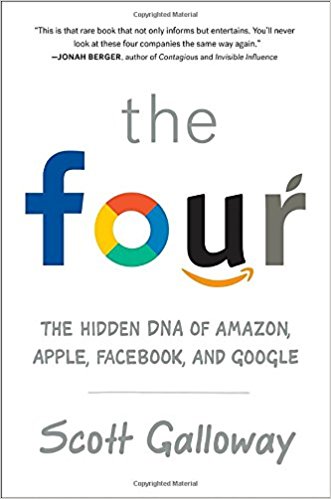You have /5 articles left.
Sign up for a free account or log in.
 The Four: The Hidden DNA of Amazon, Apple, Facebook, and Google Hardcover by Scott Galloway
The Four: The Hidden DNA of Amazon, Apple, Facebook, and Google Hardcover by Scott Galloway
Published in October of 2017.
What can reading about the four horsemen of the digital economic apocalypse, Amazon/Apple/Facebook/Google, teach us about higher ed?
Scott Galloway, an entrepreneur and more interestingly for our purposes a professor of marketing at NYU, provides some hints in his fabulously entertaining new book The Four. Galloway thinks that higher education is overdue for a horseman type disruption. He writes that beyond a few highly select institutions, that paying the cost to attend for students (and their parents) represents a poor economic decision. He recommends that tomorrow’s students should do whatever they can to either get into the most prestigious school, or failing that do whatever they can to avoid spending too much money (and going into debt) for wherever they end up.
This advice is okay as far as it goes, but it offers very little assistance for schools wishing to improve their productivity. Every college or university would like to treat their cost disease. Every school would love to figure out how to improve quality, increase access, and lower costs. Galloway offers some specifics for changing business education, basically he recommends totally shifting second year to something that is more relevant to today’s labor market. But beyond some recommendations for evolving graduate business education, Galloway is mostly silent on how he’d apply the lessons of digital platform disruption to higher ed.
This is too bad, as Galloway is completely brilliant when it comes to analyzing the operations and impact of Amazon, Apple, Facebook, and Google. Thankfully, The Four is not a history of each of these companies. Those of us most interested in making sense of the meaning of these players have been following each for years - and we don’t need another history lesson. Rather, Galloway is at his best when he is picking apart how each of the four horsemen dominate their markets and destroy their competitors.
My favorite chapters are on Amazon. My desire to understand Amazon originates in the observation that amongst all four companies, Amazon is most central to my life. I don’t use Facebook, and therefore would not miss its disappearance. Apple is a luxury technology product company that I hope - and keep hoping - will decide that higher education is a key strategic business. Google could do so much in higher education if the company ever developed a vision for moving learning and credentialing from scarcity to abundance, but I see little evidence of any creative educational thinking (at least postsecondary thinking) emanating from the Googleplex.
That leaves Amazon. The reason that Amazon matters so much to higher education is not because online shopping will put most bricks and mortar retail stores out of business. It will, and good riddance.
Rather, Amazon matters so much to higher education because of books. We don’t talk on our campuses about Amazon’s monopoly in digital books - in ebooks and audiobooks - but we should. If our real job as educators is to help students transform into (lifelong) learners, then part of that job is creating future book readers. While paper books are not going away, and neither are bookstores, an enormous proportion of future book reading will be digital. And that means Amazon. We should be much more worried than we are that Amazon owns, controls, dominates, and shapes the market for digital books.
Reading the The Four helped me better understand how Amazon came to dominate digital books. Galloway attributes Amazon’s hegemony to a combination of the brilliant single minded leadership of Jeff Bezos, cheap capital, and the failure of every other corporate boss to take imaginative risks.
Higher ed needs someone like Galloway - someone not afraid to say bold things and to make mistakes - to turn their critical lens on the academy. The fact that Galloway is a business school professor may make him somewhat qualified for this role, but my sense is that he is not a student of higher education. Rather, Galloway is the sort of professor that one would want if as a student, someone who can teach lessons that are based on experience rather than abstractions. Galloway is so funny and smart that one can’t help but wish that he’d think more deeply about applying what he knows to higher ed change.
Finally, I hope that The Four will spur some of us in higher ed to translate our worry about Amazon into action. It is clear from The Four that Amazon is only going to get bigger and stronger. We need to figure out how to start a conversation - hopefully one that includes Amazon - about the company’s cultural responsibilities as a monopolistic producer, seller, and gatekeeper of digital books.
What are you reading?




